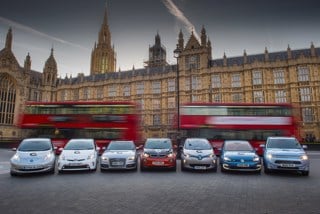The leasing sector is set to grow over the next couple of years, but the jury is out on whether any of this growth will come from the company car market.
That’s according to the British Vehicle Rental and Leasing Association (BVRLA) Industry Outlook 2020, which was unveiled at the association’s Industry Outlook Conference.
Surveying the views of 20 experts from across the automotive sector, some believe that cash allowance opt-outs will continue to shrink demand for company-managed vehicles as over-taxed workers are lured by the freedom and value for money offered by personal contract hire or the dreaded grey fleet.
The uncertainty created by the Worldwide Harmonised Light Vehicle Test Procedure (WLTP) and the Treasury’s gradual ratcheting up of company car tax has sent the sector into a terminal tailspin, says the report.
Others point to a growing number of cash takers that are being lured back by the no-hassle security of a company car.
They believe that the impending arrival of a 0% company car tax rate for electric vehicles will be a game-changer. However, as Fleet News has highlighted, the new rates still have to be adopted into law to come into effect from next April.
Many of the employees opting out of company cars were low mileage perk drivers, says the BVRLA report.
As they begin to look at their next car choice, a low-tax, cheap-to-run electric company car - with all the risk for this new technology borne by their employer - will seem very attractive.
Regardless of what happens, the continued health of the company car market is no longer the fundamental issue that it once was. No-one is relying on the company car market for their future business growth, it says.
Instead, the rise of personal contract hire, digital sales channels and electric products represent the big opportunities for the leasing market.
Personal contract hire continues to thrive as consumers become more comfortable with the concept of vehicle usage rather than ownership. New car registrations might be falling, but the leasing share of that pie is growing, it reports.
Furthermore, it says that many of the initial concerns about the administrative burden or profitability of personal contract hire are being addressed.
New digital platforms are enabling leasing companies to provide a more automated offering, freeing up employees to spend more time providing the consultancy that their customers are increasingly demanding.
“Our sector is in for a bumpy ride in 2020, but it has both hands on the wheel,” said BVRLA chief executive, Gerry Keaney.
“BVRLA members are providing more consultancy and advice and building stronger customer relationships and loyalty.
“They are ideally positioned to take advantage of some of today’s key megatrends. Finance remains cheap and society is becoming used to the idea of buying a service rather than owning an asset. At the same time, road transport has risen up the political and business agenda and expertise is in short supply.”
The BVRLA Industry Outlook 2020 report provides a collective industry view on nine key areas:
- Company car consolidation – Reports of the company car’s death have been greatly exaggerated. But is the sector struggling on with a chronic condition, or on the rapid road to recovery?
- Fleets within fleets – The word ‘fleet’ suggests an amorphous, singular mass. Taking a ‘one-size fits all’ approach creates efficiencies, but today’s complex business environment demands a more sophisticated methodology.
- Delivering digital – Rental and leasing companies are embracing digitisation in all its forms. The main limit to their ambitions will be an adequate supply of vehicle data.
- Elusive electric dreams – Electrification is the future, but we are not there yet. 2020 could see a wide gap between what is expected and what is deliverable.
- The diesel debate – There is a future for diesel, if politics doesn’t get in the way. Newer, cleaner diesel powertrains provide a low-emission solution for logistics and long distances, but there is a lot of re-education to do, and confusion to be cleared up.
- The mobility mix – While many in the automotive sector continue to dabble with a range of different mobility services and partnerships, others believe that the servitisation of existing parts of their business will provide a faster route to profit.
- Clean air chaos – The fleet industry continues to highlight the need for a consistent approach when introducing measures to tackle air quality in UK towns and cities. But is anybody listening?
- The cost of compliance – Compliance teams are expanding in the face of a growing regulatory burden. Far from seeing it as a red tape exercise, most firms are embracing the focus on developing more robust standards and processes.
- Pairing and repairing – Showrooms and websites are competing hard to sell you the latest connected, autonomous, shared and electric vehicles. But is the aftermarket ready?






















Login to comment
Comments
No comments have been made yet.